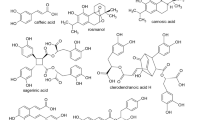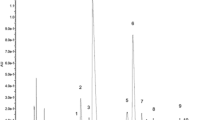Abstract
RICININE, the alkaloid of castor bean plants, is of interest since it is one of the very few natural products containing a nitrile group and since, as Leete and Leitz1 have shown, it is biogenetically derived from the vitamin, nicotinic acid. In our studies on the distribution and biogenesis of ricinine we have sought a semi-quantitative analytical method that would permit routine determination of ricinine in a large number of samples of plant tissue without tedious extraction and isolation procedures. Such a goal is hindered since ricinine is neutral and does not react with the usual ‘alkaloidal reagents’.
This is a preview of subscription content, access via your institution
Access options
Subscribe to this journal
Receive 51 print issues and online access
$199.00 per year
only $3.90 per issue
Buy this article
- Purchase on Springer Link
- Instant access to full article PDF
Prices may be subject to local taxes which are calculated during checkout
Similar content being viewed by others
References
Leete, E., and Leitz, F. H. B., Chem. and Indust., 1572 (1957).
Evans, T., J. Amer. Chem. Soc., 22, 39 (1900).
Pullman, M. E., and Colowick, S. P., J. Biol. Chem., 206, 125 (1954).
Bregoff, H. M., Roberts, E., and Delwiche, C. C., J. Biol. Chem., 205, 565 (1953).
Bogdashevskaya, O. V., Doklady Akad. Nauk. S.S.S.R., 82, 1001 (1952).
Author information
Authors and Affiliations
Rights and permissions
About this article
Cite this article
ROBINSON, T., FOWELL, E. A Chromatographic Analysis for Ricinine. Nature 183, 833–834 (1959). https://doi.org/10.1038/183833a0
Issue Date:
DOI: https://doi.org/10.1038/183833a0
Comments
By submitting a comment you agree to abide by our Terms and Community Guidelines. If you find something abusive or that does not comply with our terms or guidelines please flag it as inappropriate.



